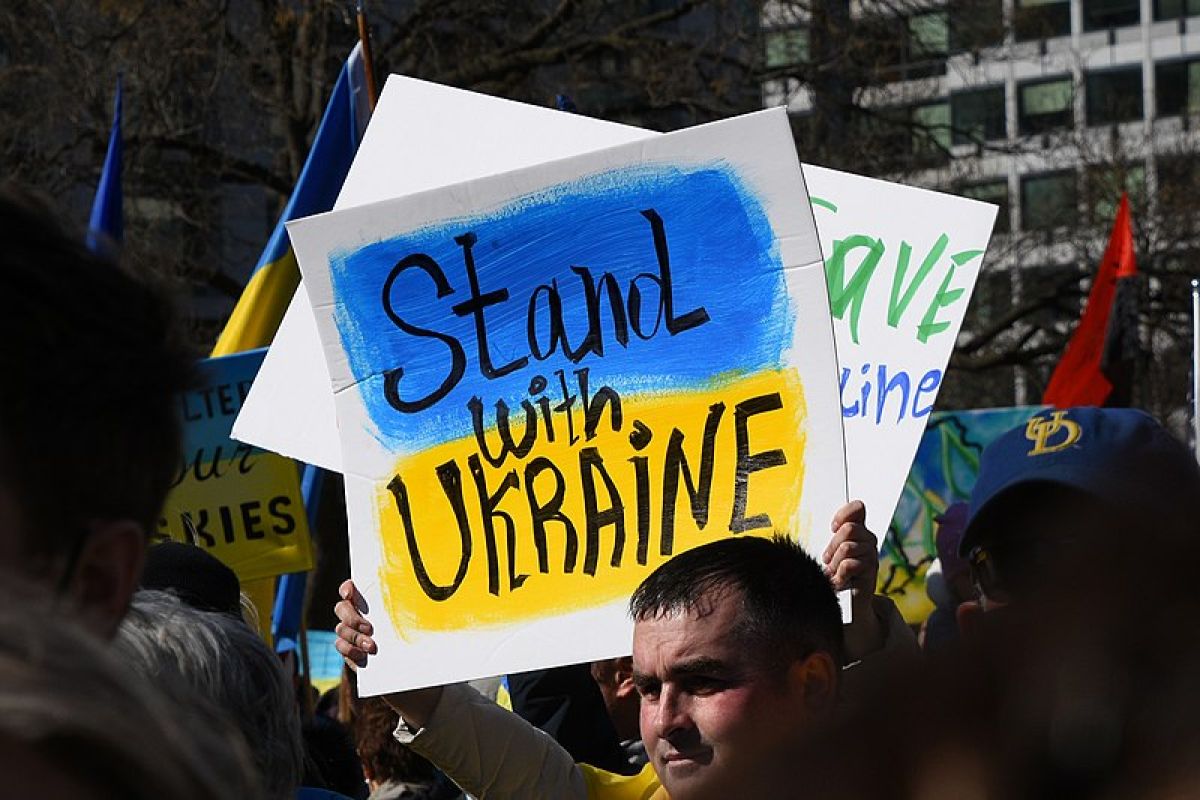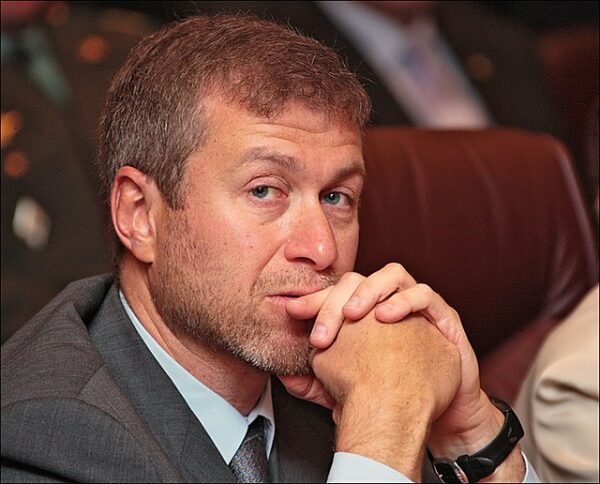How can sport stand up to Russia after Putin’s unacceptable attacks on Ukraine?
By adampogrund

The Russian invasion of Ukraine has sparked a world wide crisis with a devastating impact on Ukrainians and the potential for many thousands of casualties. It is at times like these when sport seems totally irrelevant, with the safety of innocent people at risk. However, with the international response to Russian aggression largely taking the form of a barrage of sanctions, sport certainly has a role to play. Although the sporting community has not always reacted well to dangerous regimes, through boycotts and international solidarity it can stand up and react to Vladimir Putin’s aggression.
The immediate response to the invasion has been through athletes, clubs, and fans showing support for Ukraine. Banners and flags in support of Ukraine have been held up at football matches, such as from Real Betis fans in their fixture against Zenit St Petersburg, where Ukrainian Yaroslav Rakitskiy was dropped having spoken out against Russia. Ruslan Malinovskyi revealed a ‘No to War’ T-shirt after scoring for Atalanta, whilst Ukrainian players in the Premier League, including Andriy Yarmolenko of West Ham, have been granted compassionate leave over the events.
Slavia Prague players wore T-shirts saying “we stand with Ukraine” and had appointed Ukraine international defender Taras Kacharaba captain on the night.
In boxing, preparation for Anthony Joshua’s fight against Oleksandr Usyk has been put on hold after Usyk returned home to help defend his country. Anthony Joshua responded with support, stating “I’ve learned sports and politics go hand in hand.” The Russian Daniil Medvedev, and tennis world number 1, says he wants to promote peace all over the world.
Significant concrete action has also taken place to try and isolate Russia from the world of sport, and is a more hardline and effective approach. It has mostly been done through a series of boycotts. The Russian Grand Prix in Sochi has been cancelled, with Vettel stating “I will not go. It is wrong to race in the country”. These thoughts were echoed by many fellow racers. The F1 team Haas have removed their sponsor Uralkali, a company owned by Putin-supporting Dmitry Mazepin. This was further complicated by the fact Mazepin’s son Nikita is a driver for Haas.
Ukrainian fencers pulled out of the World Championship in Cairo, instead of potentially facing Russian opposition. The boxing governing bodies, the IBF, WBA, WBC, and WBO have announced they will not sanction any title fights in Russia, and the International Judo Federation has suspended Putin’s honorary Presidency. The World Junior Swimming Championship has been cancelled, which were supposed to take place in Kazan later this August.
International unity against Russia has been in large supply. The sides who were potentially facing Russia in the World Cup Qualifiers next month, Poland, Sweden, and the Czech Republic, all agreed they would refuse to compete against Russia. This was followed by the English and Welsh Football Associations who confirmed they will not play against Russia in the foreseeable future.
Football’s international governing bodies have reacted too as FIFA originally forced Russia to play in neutral venues, with their national anthem and flag banned, under the name of the Russian Football Union.
However, a total ban has been announced, with the women’s team unable to compete at Euro 2022, after international condemnation against FIFA. The Paralympic Winter Games in Beijing starting on the 4th of March look unlikely to allow the Russian committees to compete, with the International Olympic Committee (IOC) making recommendations that Russian and Belarusian athletes and officials should be banned. The IOC have stated their decision is to “protect the integrity of global sports competitions” and that it would be unjust if Russian and Belarusian athletes could take part whilst “athletes from Ukraine are prevented from doing so because of the attack on their country”.
Boycotts from competitions will pile pressure on Russia, and are easy for institutions to enact. But, what is more challenging is snubbing financial connections with Russian backed organisations. UEFA has been highly reliant on funding from Gazprom, the Russian state-backed oil company. It has moved the Champions League 2022 final from St Petersburg to Paris, and terminated its relationship with the energy giant. Schalke have also severed all ties with the Russian company, a partnership dating 16 years.
Closer to home, Manchester United have ended their sponsorship deal with Aeroflot, Russia’s national airline. These economic deterrents play a serious role in undermining Russian influence. Nonetheless, the banning of Russian owners and freezing of funds pumped into sport by oligarchs would provide greater repercussions, especially as many have personal connections to Putin.
Roman Abramovich, a close ally of the Russian leader, announced he is handing stewardship of Chelsea to the club charity. He still remains the owner of the club. Alisher Usmanov is another oligarch with close connections to a Premier League club. He has ties with Everton, and has been described along with Abramovich as one of the “key enablers and beneficiaries of Russian kleptocracy, with significant ties/assets in the West”. A more domineering approach against these figures by the government should be introduced, and would send a greater message across Europe.

The sanctions introduced by different sports across the world have been wide-ranging, but whether they are effective is another question. In the past, there has been a soft stance towards Russian sport for its actions, both in sports and politics. Despite Russia being banned from the Olympics for state-sponsored doping offences, Russian athletes have been allowed to compete under the Russian Olympic Committee.
The aggression towards Ukraine is nothing new. The annexation of Crimea in 2014 occurred only a few months after the Sochi Winter Olympics. It also did not stop FIFA from allowing Russia to host the 2018 World Cup. The tournament took place even with Russia being known for committing many human rights violations, including state-sponsored anti-gay purges in Chechnya. In 2018 many officials and politicians did not travel to the World Cup in response to Russian activity such as the Skripal poisoning.
However, as the previous Minister for Sport Tracey Crouch argued this was a ‘soft message’ to Putin which made no tangible difference. It is a positive step forward that finally sporting bodies feel the need for strong action, but this should have come much sooner. In addition, these boycotts will only be successful according to imprisoned opposition leader Alexei Navalny if the west no longer refrains from sanctioning ‘the people with the money’.
In the past, sporting embargos have been hugely influential. The international isolation of South African sport during apartheid is credited with helping turn public opinion against the racist government. Hopefully, the continued boycott can have a similar impact on Russia. This will prove difficult as Russian political freedom and protest is limited, and many sporting bodies have serious corruption issues.
The chief executive of Gazprom Neft Alexander Dyukov, also the president of the Russian Football Union, is on the executive committee of UEFA. It is hard to trust sport to act correctly, with the 2022 World Cup taking place in Qatar, the Winter Olympics in genocide committing China, and the Champions League final originally being hosted in Russia. It was a hat trick of major events handed to undemocratic authoritarian regimes. Nevertheless, it is encouraging to see suitable efforts taking place to punish Russia for its invasion.

Sport can play a huge role in countering Russian aggression by acting as a tool of propaganda, for example with the Berlin Olympics in 1936, the last time a European conflict had shocked the world so greatly. Removing Putin’s ability to demonstrate Russian strength on the world stage should not be underestimated.
The Olympic Truce adopted by the UN General Assembly dates back to ancient Greece and calls on member states to cooperate with the IOC and IPC in their “efforts to use sport as a tool to promote peace, dialogue and reconciliation in areas of conflict during and beyond the period of the Olympic and Paralympic Games”. Its influence is clear, and evidenced by Foreign Secretary Liz Truss stating she believed an English team should boycott the Champions League final before it was moved.
This remark was widely criticised, as many argued it is not the responsibility of young athletes to take political stances instead of from elected officials. Truss’ colleague Nathalie Elphicke MP last year told Marcus Rashford he should stick to football and spend less time focused on politics, and feeding hungry children. Despite these comments, it is clear that sport can have repercussions.
The scale of Putin’s invasion on Ukraine would have been almost unfathomable even a year ago. There are devastating consequences for Ukraine and it will restructure European politics in the next decades. In these dark times it is good for sport to be united, from the players, fans, owners, and governing institutions, in their condemnation of Russian atrocities. Boycotts might not have an immediate impact but they will certainly show Putin that the whole world views his warmongering as unacceptable.







